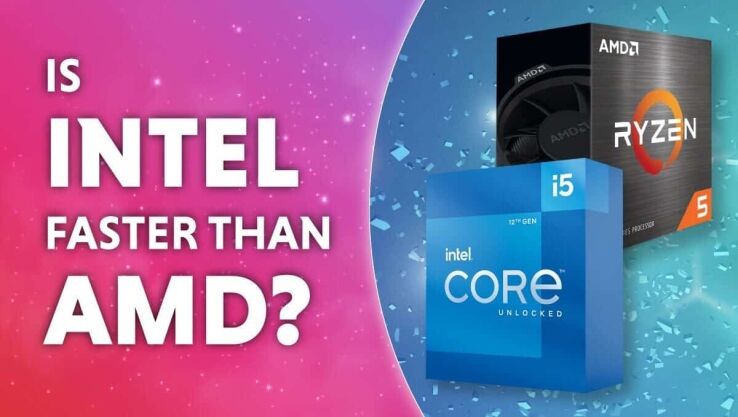Is Intel faster than AMD?
Is Intel faster than AMD? Let's find out

WePC is reader-supported. When you buy through links on our site, we may earn an affiliate commission. Prices subject to change. Learn more
Competition between Intel and AMD has been fierce these past few years. Both companies released their latest generations a few months ago. If you’re interested in picking up a new processor in 2024, you may be wondering: Is Intel faster than AMD? We find out in this article.
Now Read: Best AMD CPU
Intel vs. AMD: performance compared
But before anything else, we need to look at the two domains we can divide most workloads into – gaming and productivity. Performance in each of these two domains is influenced by different factors, so the best gaming processor is not necessarily the best at productivity work, and vice versa.
Gaming
Of course, the most straightforward way to measure gaming performance is by recording the average FPS delivered by the processor.
Currently, the fastest gaming processors belong to AMD. In particular, the Ryzen X3D lineup. There are three X3D processors available in the market currently – the Ryzen 7 5800X3D (older, Zen 3 processor), the Ryzen 9 7900X3D, and the Ryzen 9 7950X3D.
The Ryzen 7 7800X3D is expected to release on April 6th, 2023, and will likely also rank among the best gaming processors in 2024.
AMD’s X3D CPUs perform especially well in gaming because of their large L3 cache memory. – made possible by AMD’s innovative 3D V-cache technology.
A larger L3 cache allows the CPU cores to hold more data locally, resulting in less frequent processing downtimes while data from RAM make it away to the CPU.
All that said, the extra cache only benefits gaming, which is why the X3D CPUs aren’t especially good at workloads that fall into the other domain – productivity.
Productivity
Some examples of productivity workloads are content creation, video editing, 3D rendering, and digital encoding. These workloads can be broken down into smaller chunks and distributed evenly across all CPU cores. Unlike gaming, productivity workloads benefit greatly from a high CPU core and thread count.
Intel has the lead in this category at the moment. While we have some very competent and price-efficient options from the Ryzen 7000 lineup as well, with the Ryzen 9 7900 deserving a special mention, Intel’s 13th-generation CPUs simply have more cores and threads than their Ryzen counterparts, which allows them an inherent advantage in this domain.
Core and thread counts are more or less equivalent in the higher-end lineups, but Intel’s high-end CPUs also manage to take the win because of their higher clock speeds.
The best productivity processor we have today is the Intel Core i9-13900KS. AMD’s competing unit is the Ryzen 9 7950X.
You can find a detailed comparison of the two here, but the short version is that the 13900KS is 10 to 20% faster in productivity work due to its higher core count and maximum clock speed.
Intel vs AMD: Which is faster?
If you’re buying a modern CPU, it’s best to narrow it down by your price range and then compare individual options.
If budget isn’t a concern and you’re looking for raw performance, go with an AMD X3D CPU for gaming and an Intel Core i7 or Core i9 for productivity. Although, again, there are great gaming CPUs from Intel and great productivity CPUs from AMD as well.